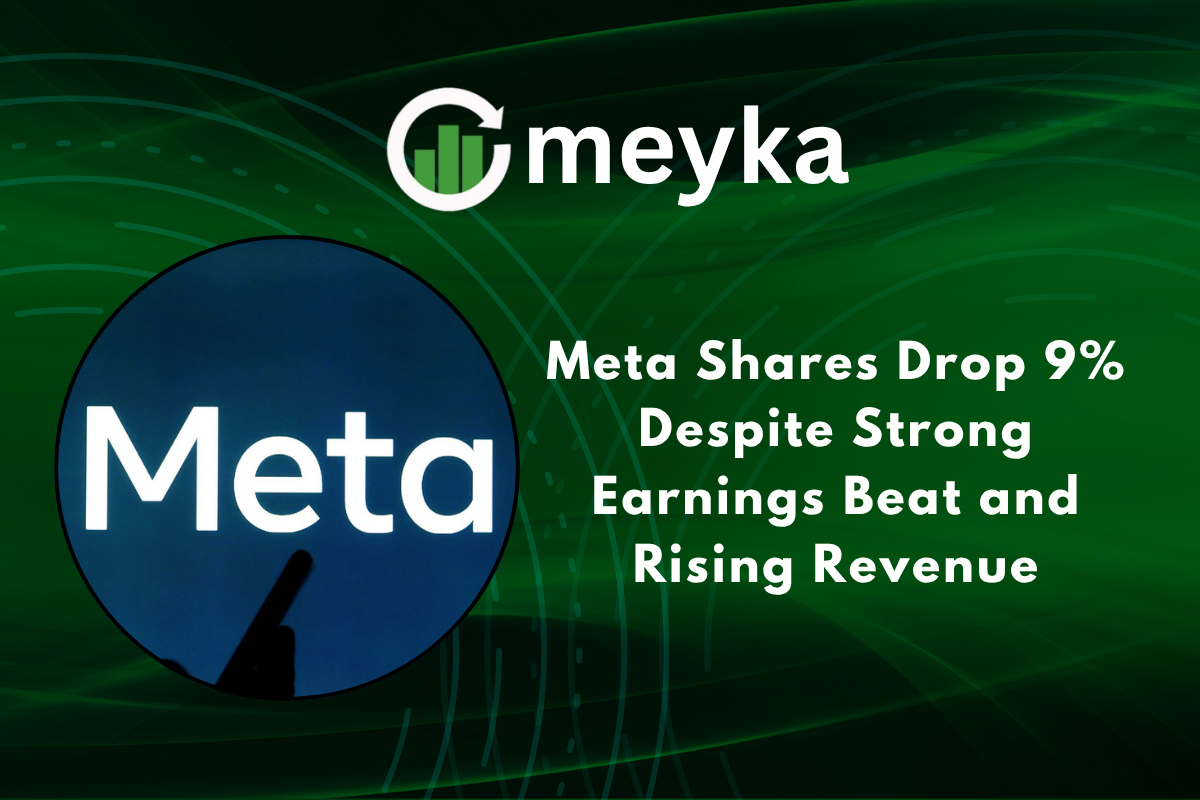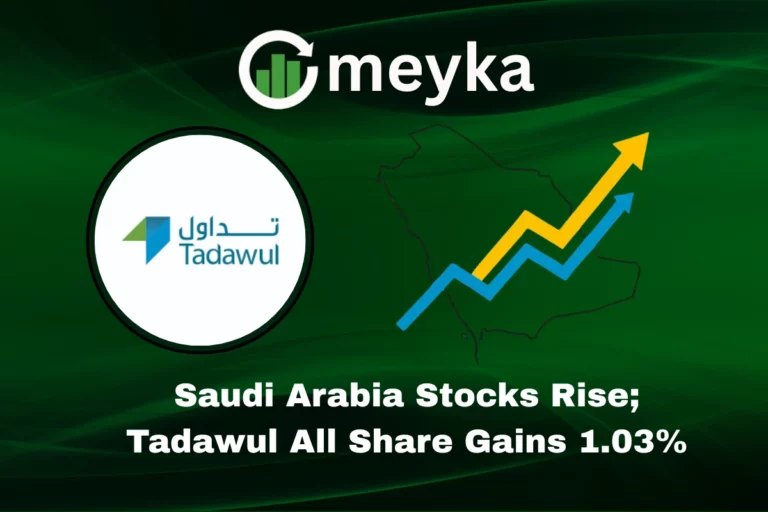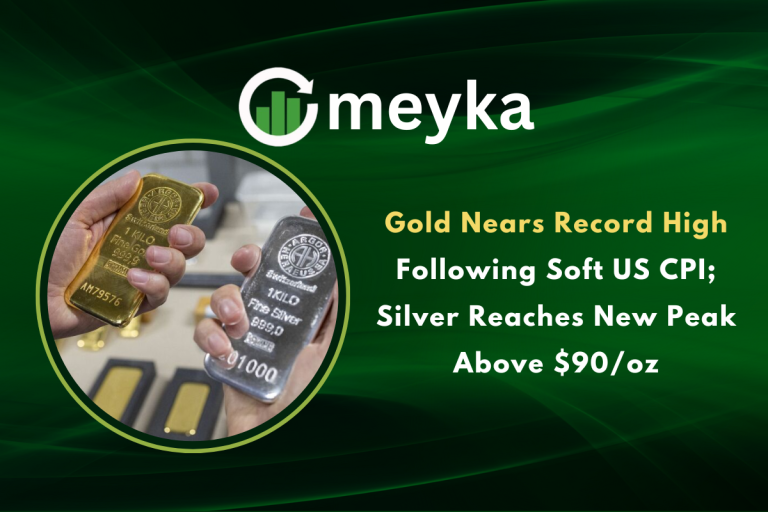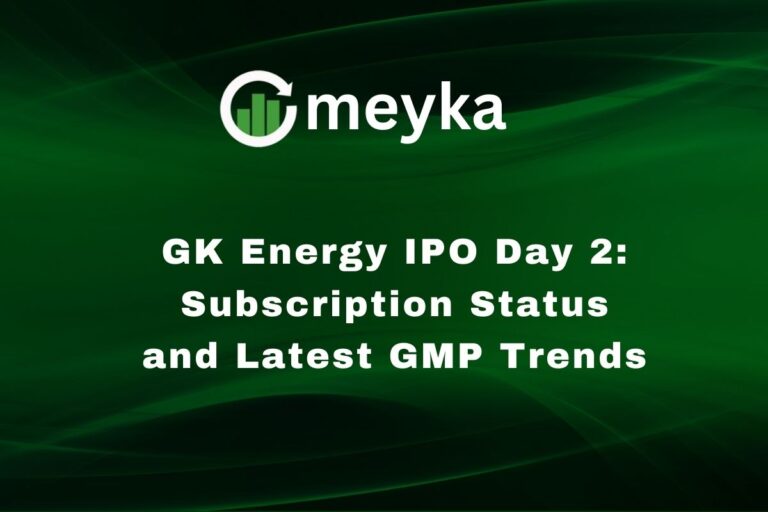Meta Shares Drop 9% Despite Strong Earnings Beat and Rising Revenue
Meta stunned markets on earnings day. The company reported record revenue, yet Meta Shares tumbled about 8% to 9% after hours. The reason was not top-line weakness; it was a nearly $16 billion one-time, non-cash tax charge and a sharp push toward higher AI spending. Investors cheered the sales numbers, then sold on the profit hit and rising costs.
Meta Shares Slide Despite Record-Breaking Quarter
What the headline numbers show: Meta posted third-quarter revenue of roughly $51.2 billion, up about 26% year over year. Yet GAAP earnings fell sharply, driven by a $15.9 billion to $15.93 billion one-time tax provision, which pushed reported EPS down to about $1.05.
The stock moved lower, even though adjusted results and fundamental ad trends remained strong.
What Caused the Sudden 9% Drop in Meta Shares?
The market reacted to two things at once: the large one-time tax charge tied to new U.S. tax rules, and guidance that capital spending on AI will be notably larger going forward.
That mix hit reported profits and raised questions about near-term margins. Traders sold quickly, driving Meta Shares down (META) nearly 9 percent in after-hours trading.
Investors React to Meta’s Q3 Earnings Report
Wall Street’s shorthand is simple: earnings matter, but surprise items and future cash needs matter more. Investors liked the ad strength, but the tax shock and rising capital expenditure plans triggered worry. It was optimism, then a reality check.
How Did the One-Time Tax Charge Impact Profit?
The tax provision, linked to recent U.S. corporate tax law changes, lowered GAAP net income by nearly $16 billion. Excluding that charge, Meta (META) noted adjusted results that were far healthier, with adjusted EPS figures materially higher than the GAAP number. Still, the headline tax hit changed investor math overnight.
What Are Analysts Saying About Meta Shares?
Some analysts framed the sell-off as a technical reaction to the tax item; others flagged worries about rising AI-related costs. Seeking Alpha sees the dip as a buying opportunity and moved to upgrade coverage in some cases, while other brokers trimmed near-term targets until the margin picture clears.
The market is divided between those who focus on underlying cash flows and those who fear rising capex.
Financial Performance and Future Outlook

Revenue growth was clear, driven by ad recovery and AI-driven ad tools. Reality Labs remains a deep investment, reporting a $4.4 billion loss on about $470 million in sales for the quarter.
Meanwhile, Meta said infrastructure and talent spending tied to AI will push capital expenditures higher in 2026, amplifying investor focus on cash returns.
Meta’s Revenue Growth and Ad Recovery
Meta’s ad products, including automation and the family of apps, continued to show strength. The company reported roughly $51.2 billion in sales, a clear beat over consensus and a sign that advertisers are back. That is the core reason many analysts emphasize the business remains resilient beneath the tax headline.
CEO Mark Zuckerberg’s Comments on AI Investments
Mark Zuckerberg reiterated that heavy AI investment is deliberate, saying the company would rather spend now than risk underinvesting. Management flagged a notably larger capex profile for next year to fund data centers and hiring, a choice that investors must weigh: growth and product edge, versus near-term margin pressure.
Comparing Meta Shares to Other Tech Giants
Meta’s situation is unusual because the revenue beat contrasts with a massive one-time profit hit. That made the stock behave like a profit-sensitive company for the day. By comparison, some peers posted cleaner beats or clearer profit guidance, which helped their shares avoid similar sell-offs.
The market is comparing Meta’s aggressive AI capex to spending plans at Microsoft and other big cloud and AI players.
Why Is Meta Facing Unique Market Pressure?
The tax provision was a surprise to many. Combined with an increased capex plan and ongoing Reality Labs losses, the company faces more near-term headline risk than some peers. The size of the charge and the public focus on AI spending amplify short-term volatility for Meta Shares.
How Are Microsoft and Alphabet Performing?
Other tech giants mirrored mixed investor reactions across the sector. While Microsoft and Alphabet also face AI investment choices, their results and guidance were judged differently by traders; this leaves Meta Shares more directly tied to investor views on ad momentum and heavy AI spending.
What’s Next for Meta Shares and Investors?
Investors will track a few clear signals: next quarter’s cash flow, clarity on how the tax change affects long-term cash taxes, and proof that AI investments lead to durable revenue gains.
If Meta can show the spending drives stronger monetization and margins over time, the share reaction could reverse. For now, caution governs many portfolios.
Can Meta Rebound After the Sell-Off?
Yes, if the company demonstrates that the AI investments convert into higher ad yields and improved margins. The market will reward confirmed progress, but until then, volatility around Meta Shares may persist. Investors will want clear signs, not promises.
Long-Term Outlook and Expert Insights
Long-term bulls point to record revenues and powerful ad tools, while skeptics watch capex and structural losses at Reality Labs. Analysts who upgraded offer a buy-the-dip thesis, while others advise caution until the next few quarters show concrete earnings resilience.
Social and market sentiment
Market and social reaction were immediate. See sample investor posts on X, reflecting fast debate over whether this is a temporary tax noise or a structural cost issue:
Conclusion
The Q3 report was a study in contrasts: record revenue and clear ad momentum, paired with a nearly $16 billion tax charge and higher planned AI spending. That set the stage for a sharp, emotional market reaction that drove Meta Shares down about 9 percent.
The big question now is execution: can Meta translate heavy AI investment into bigger, sustainable profits? Investors will watch results, capex pacing, and Reality Labs performance closely over the coming quarters.
FAQ’S
Meta shares fell about 9% despite strong revenue because a $15.9 billion one-time tax charge sharply reduced net profit and raised investor concerns about future spending on AI infrastructure.
The charge came from a one-time, non-cash tax adjustment tied to changes in U.S. tax law, which impacted Meta’s deferred tax assets and lowered GAAP earnings for the quarter.
Meta reported $51.2 billion in revenue, up 26% year-over-year, beating Wall Street estimates, but reported earnings per share dropped to $1.05 due to the large tax expense.
Mark Zuckerberg said Meta is accelerating AI spending to build long-term leadership in generative AI and ad automation, calling it a necessary investment for future growth.
Analysts say Meta shares could rebound if AI investments boost ad efficiency and profits in 2026, though short-term volatility may persist as investors monitor capital spending and tax effects.
Disclaimer
The content shared by Meyka AI PTY LTD is solely for research and informational purposes. Meyka is not a financial advisory service, and the information provided should not be considered investment or trading advice.






